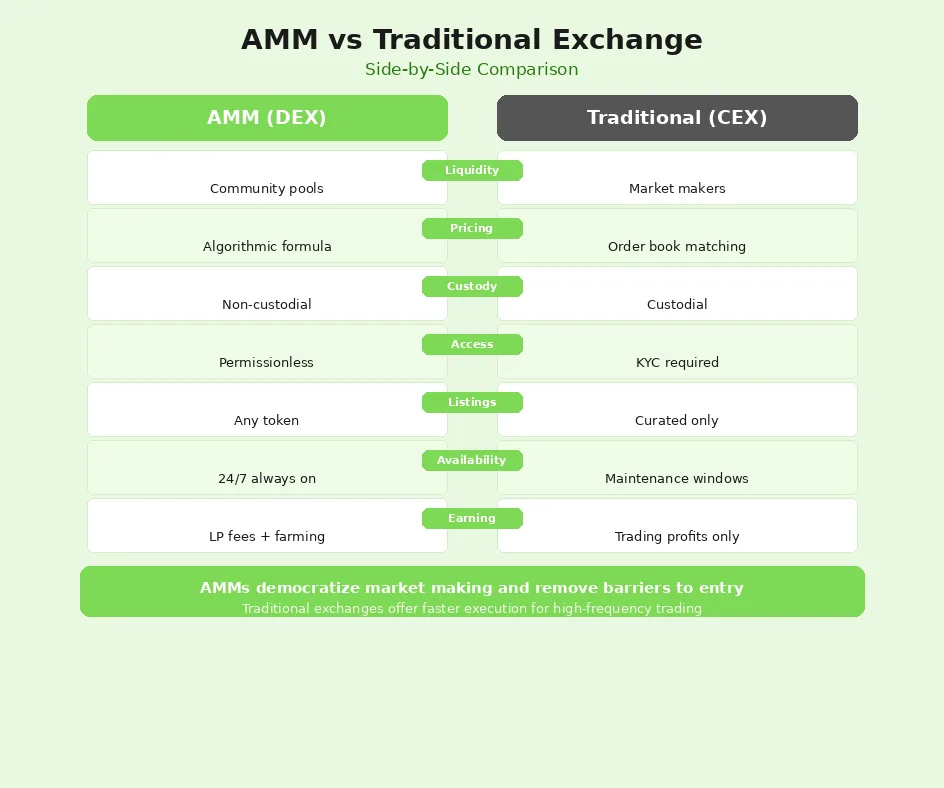Key Takeaways
- An Automated Market Maker is a decentralized protocol that uses algorithms and liquidity pools to enable token swaps without relying on traditional order books or centralized intermediaries.
- Liquidity pools are the backbone of AMMs, where users deposit token pairs to facilitate trading and earn a share of the fees generated by each swap.
- The most common AMM in crypto uses the constant product formula (x * y = k) to determine token prices automatically based on supply and demand within the pool.
- AMMs power the majority of Decentralized Exchange (DEX) platforms, including Uniswap, PancakeSwap, and Balancer, across multiple blockchain networks.
- DeFi trading through AMMs offers permissionless access, meaning anyone with a crypto wallet can trade or provide liquidity without account registration or KYC verification.
- Impermanent loss is the primary risk for liquidity providers, occurring when the price ratio of deposited tokens changes significantly from the time of deposit.
- Crypto liquidity on AMMs is contributed by everyday users rather than professional market makers, democratizing access to fee-earning opportunities in decentralized finance.
- The future of AMMs includes multi-chain interoperability, concentrated liquidity, and deeper integration with lending, derivatives, and real-world asset tokenization platforms.
- Understanding how AMM works is essential for anyone participating in DeFi, whether as a trader seeking better execution or a liquidity provider seeking passive income.
Introduction to Automated Market Makers (AMM)
The rise of decentralized finance has fundamentally changed the way people trade digital assets. At the center of this transformation sits the Automated Market Maker, a protocol design that replaced the need for traditional order books with mathematical formulas and community-contributed liquidity. If you have ever swapped tokens on a decentralized exchange, you have interacted with an AMM, whether you realized it or not.
For traders, builders, and investors navigating the crypto ecosystem, understanding how AMM works is no longer optional. It is foundational knowledge that informs better trading decisions, smarter liquidity strategies, and more informed evaluations of DeFi platforms. Let us break it down from the basics to the advanced mechanics.
What is an Automated Market Maker?
Definition and role in DeFi trading
An Automated Market Maker is a type of decentralized exchange protocol that uses smart contracts and algorithmic pricing to facilitate token swaps. Instead of matching individual buyers with sellers through an order book, an AMM lets users trade against a pool of tokens that has been deposited by liquidity providers. The price of each token is determined by a mathematical formula that adjusts automatically based on the ratio of assets in the pool.
In the context of DeFi trading, AMMs serve as the primary infrastructure for permissionless token exchange. They operate around the clock, require no registration or identity verification, and are accessible to anyone with a compatible crypto wallet. Understanding how AMM works through this open access model has made the Automated Market Maker and AMM in crypto one of the most important innovations in decentralized finance, powering billions of dollars in daily trading volume across global markets.
Difference between AMM and traditional order book exchanges
Traditional exchanges, both in crypto and traditional finance, use order books to match buy and sell orders. This requires active market participants on both sides and often relies on professional market makers to provide continuous liquidity. A crypto exchange using an order book model needs significant trading volume to function efficiently, and thin order books can lead to poor price execution.
AMMs eliminate this dependency entirely. By pooling assets from many users and using algorithms to set prices, they guarantee that trades can always execute, regardless of whether there is a matching counterparty at that moment. This fundamental difference is what makes AMM in crypto so revolutionary: it democratizes market making and removes the barriers that traditionally limited who could participate in providing liquidity. For teams exploring these architectures, understanding DEX order book and AMM mechanics provides valuable context.
Importance of AMMs in Crypto
Enabling decentralized trading on DEX
Before AMMs, decentralized exchanges struggled with liquidity and user experience. Early DEX platforms attempted to replicate the order book model on-chain, but the slow transaction speeds and high gas costs of blockchains like Ethereum made this approach impractical. The Automated Market Maker model solved this problem by replacing the order book with a simple, elegant mechanism that works well within the constraints of blockchain technology.
Today, virtually every major Decentralized Exchange (DEX) is built on AMM principles. From Uniswap and SushiSwap on Ethereum to PancakeSwap on BNB Smart Chain, the AMM model has proven to be the most effective architecture for decentralized trading. It enables a Decentralized Exchange (DEX) to offer deep liquidity, fast execution, and a seamless user experience that rivals any centralized crypto exchange alternative.
Providing liquidity for crypto trading platforms
Crypto liquidity has historically been concentrated on centralized platforms with professional market makers. AMMs changed this by allowing anyone to become a liquidity provider. By depositing token pairs into a pool, ordinary users can contribute to the crypto liquidity of a platform and earn fees in return. This crowdsourced approach to liquidity provision has unlocked trillions of dollars in cumulative trading volume across DeFi platforms.
Industry Principle: Crypto liquidity is the lifeblood of any trading platform. Without sufficient liquidity, even the best-designed exchange will suffer from poor price execution and user attrition. AMMs solve this problem at its root by incentivizing community participation.
How Automated Market Makers Work
Understanding how AMM works at a technical level is essential for both traders and liquidity providers. The mechanics are elegant in their simplicity, but the implications are profound for how value is exchanged in decentralized systems.
Understanding Liquidity Pools
Role of liquidity providers
Liquidity providers (LPs) are the users who deposit tokens into a pool, making DeFi trading possible. Without LPs, there would be no assets for traders to swap against. In return for providing this critical service, LPs earn a proportional share of the trading fees generated every time someone executes a swap in their pool. On most platforms, these fees range from 0.1% to 0.3% per trade, distributed among all LPs based on their share of the pool.
The role of liquidity providers is fundamentally different from traditional market making. In conventional markets, market makers are specialized firms with significant capital and sophisticated algorithms. In the AMM model, anyone can be a liquidity provider. This democratization of market making is one of the most powerful aspects of liquidity pools and has opened up earning opportunities that were previously reserved for institutional players.
Pooling tokens and incentives
When a user deposits into a liquidity pool, they typically provide equal value of two tokens (for example, ETH and USDC). In return, they receive LP tokens that represent their share of the pool. These LP tokens can often be staked in yield farming programs for additional rewards, creating a layered incentive structure that attracts crypto liquidity from across the ecosystem. Many DeFi protocols offer governance tokens as additional incentives, aligning the interests of liquidity providers with the long-term success of the platform.
AMM Algorithms
Constant product formula (x * y = k)
The most widely used AMM algorithm is the constant product formula, popularized by Uniswap. The formula is simple: x * y = k, where x is the quantity of Token A, y is the quantity of Token B, and k is a constant. When a trader buys Token A from the pool, the amount of Token A decreases and Token B increases (because the trader deposits Token B), but the product k remains the same. This automatic rebalancing is what determines the price at any given moment.
For example, consider a pool with 100 ETH and 100,000 USDC, giving k = 10,000,000. If a trader wants to buy 10 ETH, the pool must maintain k, so it requires the trader to deposit approximately 11,111 USDC (because 90 * 111,111 = 10,000,000). The effective price is 1,111 USDC per ETH, which is higher than the initial 1,000 USDC per ETH. This price increase for larger trades is what creates slippage, and it ensures that the pool can never be completely drained of either asset.
Other AMM protocols
While the constant product formula dominates, other AMM models have been designed for specific use cases. Curve Finance uses a stableswap algorithm optimized for assets that should trade at near-equal prices, like USDC/USDT. Balancer allows pools with more than two tokens and customizable weight ratios. Uniswap V3 introduced concentrated liquidity, letting LPs specify price ranges where their capital is active. Each of these innovations expands the growing AMM in crypto landscape and addresses specific limitations of the basic constant product model.
Token Swapping on AMMs
How trades occur without order books
When a user initiates a token swap on an AMM, the process is straightforward. The user connects their wallet, selects the tokens they want to swap, enters an amount, and confirms the transaction. Behind the scenes, the smart contract calculates the output amount based on the pool’s current balances and the AMM formula, deducts the trading fee, and executes the swap atomically within a single blockchain transaction. There is no order matching, no waiting, and no counterparty risk in the traditional sense.
Fees and slippage
Every swap on an AMM incurs a trading fee, typically between 0.1% and 1% depending on the protocol and the pool. This fee is distributed to liquidity providers as compensation for the capital they have contributed. Slippage, which is the difference between the expected and actual execution price, increases with larger trade sizes relative to the pool. Traders can set slippage tolerance limits, and the transaction will automatically revert if the price moves beyond the acceptable range. Understanding these mechanics is central to effective DeFi trading on any AMM platform.
AMM Token Swap Lifecycle
| Step | Stage | Description | Actor |
|---|---|---|---|
| 1 | LP Deposit | Liquidity providers deposit equal-value token pairs into the smart contract pool | Liquidity Provider |
| 2 | Pool Activation | Pool becomes active with initial price set by the ratio of deposited tokens | Smart Contract |
| 3 | Swap Initiation | Trader connects wallet, selects token pair, and enters swap amount | Trader |
| 4 | Price Calculation | AMM algorithm calculates output amount based on pool balances and formula | Smart Contract |
| 5 | Swap Execution | Tokens are exchanged atomically; fee is deducted and added to pool reserves | Smart Contract |
| 6 | Pool Rebalance | Pool ratios update, price adjusts for the next trade according to the formula | Smart Contract |
| 7 | Fee Distribution | Trading fees accumulate in the pool and are claimable by LPs proportionally | Liquidity Provider |
Types of AMM Protocols
The AMM in crypto ecosystem spans multiple blockchains, each with its own set of protocols optimized for different user needs, fee structures, and performance characteristics. Understanding the landscape helps traders and builders choose the right platform for their goals.
Ethereum AMMs
Popular protocols like Uniswap, Balancer
Ethereum remains the birthplace and largest ecosystem for AMM protocols. Uniswap, launched in 2018, pioneered the constant product model and has processed hundreds of billions in cumulative volume. Its V3 upgrade introduced concentrated liquidity, allowing LPs to allocate capital within specific price ranges for dramatically improved capital efficiency. Balancer takes a different approach, supporting pools with up to eight tokens and customizable weight ratios, which enables portfolio-like liquidity pool configurations. SushiSwap, Curve Finance, and 1inch (as an aggregator) round out the Ethereum AMM ecosystem. For teams exploring the broader landscape, a deeper look at decentralized exchanges across blockchain networks offers valuable context for platform selection.
Binance Smart Chain AMMs
PancakeSwap and other BSC AMM platforms
BNB Smart Chain (BSC) became a popular AMM destination thanks to significantly lower gas fees compared to Ethereum. PancakeSwap is the dominant Decentralized Exchange (DEX) on BSC, offering familiar AMM functionality with the added benefit of lottery, NFT, and prediction market features. Other BSC AMMs include Biswap and ApeSwap. The lower transaction costs on BSC made AMM in crypto and DeFi trading accessible to users who were priced out of Ethereum during periods of high gas fees, demonstrating how AMMs can adapt to different blockchain environments.
Popular AMM Protocols Comparison
| Protocol | Blockchain | AMM Model | Key Feature | Swap Fee |
|---|---|---|---|---|
| Uniswap V3 | Ethereum, L2s | Concentrated Liquidity | Custom price ranges for LPs | 0.01% – 1% |
| Curve Finance | Ethereum, Multi | StableSwap | Optimized for stablecoin swaps | 0.04% |
| Balancer | Ethereum, L2s | Weighted Pools | Multi-token, custom weight pools | 0.1% – 1% |
| PancakeSwap | BNB Smart Chain | Constant Product | Low gas fees, gamified features | 0.25% |
| SushiSwap | Multi-chain | Constant Product | Cross-chain, integrated lending | 0.3% |
| Raydium | Solana | Hybrid AMM + Order Book | Serum order book integration | 0.25% |
Benefits of Using AMMs
For Traders
Decentralized finance advantages
DeFi trading on AMMs offers several distinct advantages over centralized alternatives. Users maintain full custody of their assets until the moment of execution, eliminating counterparty risk. There are no account freezes, no withdrawal restrictions, and no dependency on a centralized entity that could fail or act against user interests. The permissionless nature of AMMs means that any token with a liquidity pool can be traded instantly, including newly launched tokens that have not yet been listed on centralized platforms. Understanding how AMM works through this open access model has been particularly valuable for early-stage participants in emerging token ecosystems.
Easy token swapping
The user experience on modern AMMs has improved dramatically. Connecting a wallet, selecting tokens, and executing a swap takes seconds. Most Automated Market Maker interfaces display real-time price quotes, estimated output, slippage impact, and gas costs before the user confirms. This transparency gives traders full information to make informed decisions. For the crypto exchange landscape broadly, AMMs have set a new standard for swap simplicity that centralized crypto exchange platforms are now working to match.
For Liquidity Providers
Earning fees and yield farming opportunities
Liquidity providers earn passive income through their share of trading fees. On a busy pool with high volume, this can translate to significant annual returns. Beyond base fees, many protocols offer yield farming programs where LPs stake their LP tokens to earn additional governance tokens. These layered incentives can improve overall crypto liquidity returns and push total APY into double or even triple digits during promotional periods, though such rates typically normalize over time. Liquidity pools remain one of the most accessible ways for everyday users to earn yield in decentralized finance.
Supporting DeFi platforms
By contributing to liquidity pools, providers play a direct role in supporting the health and usability of DeFi platforms. Deeper liquidity means lower slippage for traders, better price execution, and a more competitive crypto exchange experience across global markets. This symbiotic relationship between traders and liquidity providers is what makes the AMM model sustainable. For organizations building in this space, partnering with specialized DEX platform teams ensures that AMM architecture is optimized from the ground up.
Building crypto exchanges with AMM infrastructure from day one enables deeper liquidity and better user retention.
Challenges and Risks of AMMs
No financial system is without risk, and AMMs are no exception. Understanding how AMM works at the risk level and the challenges is essential for both traders and liquidity providers to make informed decisions and manage their exposure effectively.
Impermanent Loss
How it affects liquidity providers
Impermanent loss is the most widely discussed risk for AMM liquidity providers. It occurs when the price of tokens in a pool diverges from the price at the time of deposit. Because the AMM algorithm automatically rebalances the pool, a large price movement means the LP ends up with more of the depreciating token and less of the appreciating one compared to simply holding both tokens in a wallet.
For example, if you deposit equal values of ETH and USDC, and ETH doubles in price, the AMM will have sold some of your ETH to maintain the formula balance. When you withdraw, you will have less ETH and more USDC than you started with. While you still earned trading fees, the net return may be less than if you had simply held the tokens. This is impermanent loss in action, and it is the primary cost of providing crypto liquidity through an Automated Market Maker.
Smart Contract Risks
Security considerations in AMM protocols
AMMs operate entirely through smart contracts, and bugs in contract code can lead to exploits that drain user funds. The DeFi space has experienced numerous hacks, from reentrancy attacks to flash loan exploits. Even well-audited protocols are not immune, as novel attack vectors continue to emerge. Users should prioritize protocols with multiple independent audits, active bug bounty programs, and a track record of responsible security practices. Understanding these risks is particularly critical for anyone deploying significant capital into DeFi trading platforms.
Risk Warning: Never deposit more into liquidity pools than you can afford to lose. Smart contract risk, impermanent loss, and token price volatility can all result in partial or total loss of capital. Always verify contract audits before participating in any AMM protocol.
AMM vs Traditional Exchanges
Key Differences

Order book vs automated liquidity pools
The core architectural difference between AMMs and traditional exchanges is how liquidity is sourced and prices are determined. Order book exchanges require active participants to place limit orders, and trades execute when buy and sell orders overlap. This model works well when there is sufficient market depth but struggles with less liquid trading pairs. AMMs replace this with liquidity pools and algorithmic pricing, guaranteeing that any trade can execute at any time, with the price adjusting automatically based on supply and demand within the pool.
Centralized vs decentralized trading
Beyond the mechanism, the philosophical difference is significant. Centralized crypto exchange platforms require users to deposit funds into the exchange’s custody, creating counterparty risk. They also require identity verification, can restrict access based on geography, and are subject to potential downtime or regulatory shutdowns. AMM-based Decentralized Exchange (DEX) platforms operate without a central authority, are permissionless, and allow users to trade directly from their wallets. The Rubic cross-chain exchange case study illustrates how decentralized trading infrastructure can scale across multiple networks.
AMM vs Traditional Exchange: Comparison
| Feature | AMM (DEX) | Traditional Exchange (CEX) |
|---|---|---|
| Liquidity Source | Community-contributed pools | Professional market makers |
| Price Discovery | Algorithmic (formula-based) | Order book matching |
| Custody | Non-custodial (user wallet) | Custodial (exchange wallet) |
| Access | Permissionless, wallet only | KYC required, account-based |
| Token Listings | Permissionless (any token) | Curated listing process |
| Availability | 24/7, no downtime | Subject to maintenance windows |
| Earning Opportunity | LP fees, yield farming | Limited to trading profits |
Selecting the Right AMM Model for Your Needs
Choosing the right AMM protocol depends on several factors: for stablecoin-to-stablecoin swaps, Curve’s StableSwap algorithm offers the lowest slippage. For general token trading, Uniswap V3’s concentrated liquidity provides the best capital efficiency. For portfolio-style exposure, Balancer’s multi-asset pools are ideal. Consider gas costs (Ethereum vs. L2s vs. BSC), the depth of liquidity pools for your target tokens, the protocol’s audit history and track record, and whether additional yield farming incentives align with your strategy. Teams building on these models benefit from consulting DEX platform architecture guides to understand the underlying infrastructure requirements.
Future of AMMs in DeFi
The Automated Market Maker model continues to evolve rapidly, with innovations that address current limitations and expand the scope of what decentralized trading can achieve. The trajectory points toward more efficient, more accessible, and more interconnected AMM systems.
Innovations in AMM Protocols
Multi-chain AMMs
The future of AMM in crypto is multi-chain. Users increasingly expect to trade assets across Ethereum, Solana, BNB Chain, Arbitrum, Polygon, and other networks without manual bridging. Cross-chain AMM protocols are emerging that enable seamless token swaps between blockchains, aggregating crypto liquidity from multiple sources to offer better prices and deeper pools. This interoperability is critical for the long-term scalability of DeFi trading and for reducing the fragmentation that currently limits the ecosystem.
Integration with other DeFi services
AMMs are increasingly integrated with lending protocols, derivatives platforms, and real-world asset tokenization services. Composability, the ability to stack DeFi protocols together like building blocks, is one of the most powerful features of the ecosystem. A user can provide liquidity to an AMM, use the LP tokens as collateral for a loan, and deploy that loan into another yield opportunity, all within a single ecosystem. This integration deepens the utility of liquidity pools and strengthens the overall DeFi infrastructure.
Build Your Own AMM-Powered DEX Platform
Launch a secure, scalable decentralized exchange with custom AMM models, liquidity pools, and smart contracts tailored to your business.
Launch Your Exchange Now
Role in Blockchain Trading Solutions
Driving the growth of decentralized finance platforms
AMMs are not just a trading mechanism. They are the foundational infrastructure layer for the entire decentralized finance ecosystem. Every DeFi protocol that involves token exchange, whether it is a lending platform liquidating collateral, a derivatives protocol settling contracts, or a DAO managing its treasury, ultimately relies on AMM liquidity to function. As the DeFi ecosystem matures and regulatory clarity improves across major financial markets, the expanding role of AMM in crypto in powering institutional-grade financial products will only grow.
The Automated Market Maker has come a long way from its origins as a simple token swap mechanism. Today, it underpins a multi-billion dollar ecosystem of decentralized financial services. For traders, it offers permissionless access to a global market. For liquidity providers, it offers yield opportunities that were previously reserved for institutional players. And for builders, it offers a proven, battle-tested architecture on which to build the next generation of crypto exchange platforms and DeFi platforms. Understanding how AMM works is not just about understanding a technology. It is about understanding the future of finance itself.
Frequently Asked Questions
An Automated Market Maker is a type of decentralized exchange protocol that uses mathematical algorithms and liquidity pools to facilitate token swaps instead of traditional order books. Users trade directly against pooled assets contributed by liquidity providers, and prices are determined automatically by a formula. This model enables permissionless, 24/7 DeFi trading without needing a centralized intermediary to match buyers and sellers.
An AMM works by maintaining liquidity pools that contain pairs of tokens. When a user wants to swap one token for another, they trade against the pool rather than another individual. The price is calculated using a mathematical formula, most commonly x * y = k, where x and y represent the token quantities in the pool and k is a constant. After each trade, the pool rebalances and the price adjusts automatically.
Liquidity pools are smart contracts that hold reserves of two or more tokens, providing the assets needed for trading on a decentralized exchange. Users known as liquidity providers deposit equal values of token pairs into these pools and earn a share of the trading fees generated by swaps. These pools replace the role of market makers in traditional finance, ensuring that trades can always be executed regardless of whether a direct counterparty is available.
Impermanent loss occurs when the price of tokens in a liquidity pool changes relative to when they were deposited, resulting in a lower dollar value compared to simply holding the tokens in a wallet. The loss is called “impermanent” because it can reverse if prices return to their original ratio. However, if a liquidity provider withdraws while prices are divergent, the loss becomes permanent and can significantly reduce the returns earned from trading fees.
Order book exchanges match individual buy and sell orders from different users, requiring sufficient market depth and active participants on both sides. AMMs eliminate this need by using algorithmic pricing and pooled liquidity, allowing anyone to trade at any time without waiting for a matching order. Order books are common on centralized platforms, while AMMs power most decentralized exchanges in the DeFi ecosystem.
The most widely used AMM protocols include Uniswap and SushiSwap on Ethereum, PancakeSwap on BNB Smart Chain, and Curve Finance which specializes in stablecoin swaps. Balancer offers customizable pool ratios, while Trader Joe and Raydium serve the Avalanche and Solana ecosystems respectively. Each protocol has unique features, but they all operate on the core AMM principle of algorithmic pricing with pooled liquidity.
Yes, liquidity providers earn a share of trading fees generated every time someone swaps tokens using their pool. Many protocols also offer additional token rewards through yield farming programs, which can significantly boost returns. However, earnings must be weighed against risks like impermanent loss, smart contract vulnerabilities, and token price volatility, so careful research is essential before committing capital.
Reviewed & Edited By

Aman Vaths
Founder of Nadcab Labs
Aman Vaths is the Founder & CTO of Nadcab Labs, a global digital engineering company delivering enterprise-grade solutions across AI, Web3, Blockchain, Big Data, Cloud, Cybersecurity, and Modern Application Development. With deep technical leadership and product innovation experience, Aman has positioned Nadcab Labs as one of the most advanced engineering companies driving the next era of intelligent, secure, and scalable software systems. Under his leadership, Nadcab Labs has built 2,000+ global projects across sectors including fintech, banking, healthcare, real estate, logistics, gaming, manufacturing, and next-generation DePIN networks. Aman’s strength lies in architecting high-performance systems, end-to-end platform engineering, and designing enterprise solutions that operate at global scale.






